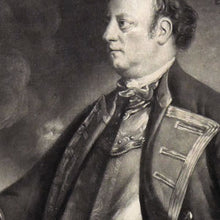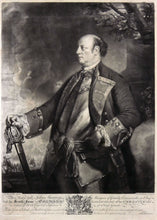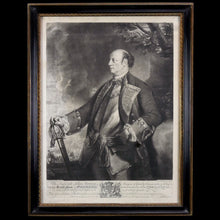Engraving - The Marquis of Granby, 1760
- Regular price
- £775
- Sale price
- £775
- Regular price
-
- Unit price
- /per
Adding product to your cart
Overall: 47cm (18.5in) x 36cm (13.75in)
Mezzotint. Portrait after Reynolds, standing almost three-quarter length, in profile and with eyes to left, wearing uniform, his right hand resting on his sword, his left arm on a rock to right, with his hand in his sash; battle beyond to left. Titled below the image with 'Commander in Chief of the British Forces in Germany Lieutenant General of the Ordnance and Colonel of the Royal Regiment of Horse Guards.', with a dedication from the engraver to the Duke of Rutland, a crest bearing the motto 'Pour y Parvenir', and "J. Reynolds Pinxt. / Richd. Houston fect. 1760 / Published accordg. to Act of parliament, Price 5s., Sold by Richd. Houston, next the Golden Lion, Charing Cross.”. Contained in period glazed frame.
Read more
John Manners, Marquess of Granby (1721–1770), son of the 3rd Duke of Rutland, was the beloved hero of the Seven Year's War (1756–63). In 1759, following the Battle of Minden, his sister-in-law, Countess of Aylesford, commissioned a portrait from Sir Joshua Reynolds (1723-1792) depicting him as Commander-in-Chief of the British Forces in Germany, wearing the uniform of the Royal Horse Guards (The Blues). Houston based his mezzotint on Reynolds image. Most strikingly his head is uncovered, as was his personal habit.
Educated at Eton, Trinity College, Cambridge, and during a Grand Tour of the Mediterranean in 1742, Granby was commissioned Colonel of the 'Leicester Blues', one of the 'noble' short-service regiments raised to fight Bonnie Prince Charlie. Having served on the staff of the Duke of Cumberland at Culloden in 1746, he became an intelligence officer in Flanders during the latter stages of the War of the Austrian Succession (1740-48). Granby was returned as MP for Cambridge in 1754, in continuation of the political career he conducted alongside his military duties. He was promoted to major-general in 1755 and appointed colonel of the prestigious Royal Horse Guards (The Blues) by King George II in 1758.
During the Seven Years War (1756-63), he commanded a cavalry brigade in Germany and helped reorganise the mounted units into light and heavy roles and improved their training. He commanded the second line of cavalry at Minden in 1759, and was then given command of the entire British force in Germany after Lord George Sackville’s dismissal. That year, he also became Lieutenant-General of the Ordnance. Always a fearless battlefield commander, he famously led a cavalry charge against the French at the Battle of Warburg on 31 July 1760 that caused his hat and wig to blow off, giving rise to the expression 'to go at (something) bald-headed’.
His victory at Warburg, where he skilfully deployed his cavalry and horse artillery to maximum effect against a much larger enemy force, marks him out as one of the great commanders. He went on to help defeat the French again at the battles of Vellingshausen (1761) and Whilhelmsthal (1762), co-operating well with his German allies. It was a testament to Granby's reputation as a commander that his French opponent at Warburg and Vellinghausen, the Duc de Broglie, later commissioned Sir Joshua Reynolds for a full-length portrait of him.
Granby returned home from Germany to a hero's welcome. Like his contemporary, General James Wolfe, his popularity and celebrity led to him being commemorated in paintings, prints, medals and ceramics. This popularity was founded not only upon his great personal bravery, but also on his well-known generosity and concern for the welfare of his men. For example, when the 'Leicester Blues' mutinied over withheld wages, Granby paid the money out of his own pocket before they were due to be disbanded.
In April 1762, while colonel of the 21st Light Dragoons (Royal Foresters), he happily paid over £105 (around £22,000 today) for dinner for the whole regiment in the Half Moon Inn at Hertford. During the campaign in Germany, he made sure he was kept informed about the hospital accommodation his wounded men were given. Edward Penny’s painting ‘The Marquess of Granby relieving a sick soldier’, showing him acting as a man of charity rather than as a great general, helped secure his public appeal. A hard drinker himself, Granby also assisted some of his soldiers in setting up as publicans upon their discharge from the Army. To this day, a large number of public houses are named after him.






